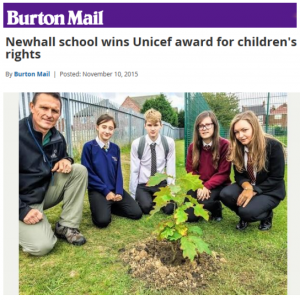 SSAT members William Allitt School in Swadlincote, Derbyshire this year decided to pursue the UNICEF Rights Respecting Schools Award (RRSA) as a logical way to progress its collaborative way of working. We spoke to RRSA lead Philippa Saddington about the school’s journey so far, and what lies ahead.
SSAT members William Allitt School in Swadlincote, Derbyshire this year decided to pursue the UNICEF Rights Respecting Schools Award (RRSA) as a logical way to progress its collaborative way of working. We spoke to RRSA lead Philippa Saddington about the school’s journey so far, and what lies ahead.
The school has previously found the skills-based Opening Minds curriculum in Y7 to be very effective. It gives the students the opportunity to work in teams and in groups, fostering a collegiate atmosphere towards a common goal.
Parents like this model of working too, and it has had a positive effect on results. RRSA will be one vehicle to extending this approach into year 8 and beyond.
Citizenship was an important aspect of the school’s decision: RRSA will give the students knowledge and ownership of their rights as detailed in the United Nations Convention on the Rights of the Child (CRC).
Equally, it is stressed that the CRC rights are universal: all children have them regardless of nationality and status, so as well as understanding our own rights, we must respect everyone else’s.
This gives empowerment to the students, but it is absolutely not an excuse to let them do as they like: rather, it is an opportunity to take ownership of their own education and school experience.
Progress so far
‘We are very much at the start of our journey,’ says Philippa. ‘The biggest tangible results at present are lots of planning documents, a nice certificate to say we have the RoC – and the steering group planted a tree as a symbol of our journey.’
It’s now that the hard work starts, and Philippa adds: ‘I’m very grateful to the student-led steering group who are helping me to develop ways to place the CRC firmly at the heart of everything we do at school.
A big priority for us at present is to get the CRC into our everyday teaching, which is a challenge as it’s easy to talk about human rights when you’re teaching PSHE, but getting human rights into long division is by no means straightforward!
‘It’s easy to talk about human rights when you’re teaching PSHE, but getting human rights into long division is by no means straightforward!’
‘But we have to start somewhere, and continual piloting and staff- and student-led evaluation will help us to build on and share good practice.
Change will be slow, but it will be fascinating to observe. We are confident that the culture and ethos of the school will alter as rights, and rights- respecting language, filter into everything we do.’
Next stage
The next stage for the school is Level 1 of the RRSA, and the ultimate goal is Level 2. Philippa and two colleagues visited a primary school in Swansea which has been a RR school for several years, and she says, ‘it was a truly magical place. We share some of the challenges they face, and as a school in SM have some different ones too to overcome, but we aim to make our school into a peaceful, ordered, considerate community, like the one we saw in Swansea.
It is a very exciting time for us and I’m so lucky to be involved from the start and helping to shape the changes taking place.’
Find out how your school can get involved with the Rights Respecting Schools Award.
Find out more about the United Nations Convention on the Rights of the Child.
Find out more about the Opening Minds Curriculum.
Visit William Allitt School’s website.
Follow William Allitt School on Twitter: @william_allitt
Follow SSAT on Twitter: @SSAT
